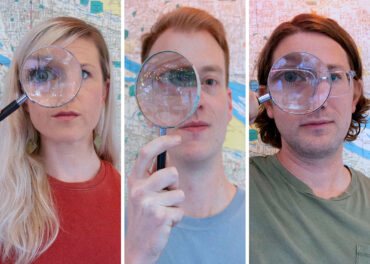
Photo by Sam Reynolds
Ok, let’s get this story straight: Lubec was an indie rock band from Portland, Oregon. And a very good one at that.
Like a lot of indie rock bands, they released some noisy, but hook-heavy tapes on a few small, but influential record labels, and played some gigs on both coasts. Like a much smaller subdivision of indie rock bands, they willfully embraced a strenuous, hard to pin down sound. Their game was one of cerebral discordance and chiming pop melodies in a constant, deafening battle, one that waged on for roughly three minutes and thirty seconds at a time (minus the breath-catching interludes). Slingshot guitar riffs, electric piano strikes and falling-down-the-stairs drum fills collapsing into moments of genuine awe. Honey and sandpaper in equal measure. A Lubec song is a lot like finding some great, life-alerting beauty laid just beneath the surface of swirling riptide. To love their music is to love that beautiful chaos.
Their story starts, as band origins often do, on the campus of a small liberal arts college–in this case, William & Mary in Virginia. In fact, their roots date back to an open mic night at W&M where principles Eddie Charlton (guitar/vocals) recruited Caroline Jackson (keys/vocals) to perform some songs he had written as an undergrad. At this point, we feel it’s best to get out of the way and let the band and those closest to them do the talking. Flip through the digital scrapbook lovingly prepared by Caroline at the link below and then read on as we look back on the life and times of Lubec.
Caroline Jackson: Eddie and I performed a couple songs together for a songwriter series at William & Mary in about 2008 that eventually became Lubec songs, does that count?
Eddie Charlton: I guess you could say we lasted for about ten years. I think of Lubec really starting up in 2009 with my friend Brandon Martin who played drums. It was just kind of an outlet more than anything else at first.
Jackson: I should say that Eddie started Lubec in Virginia right after college, and I played with them a couple times, but I was living in Pennsylvania then and not officially in the lineup.
Charlton: Things kinda coalesced once Caroline fully joined us.
Jackson: I think we all had a sense that if we were given some huge opportunity to pursue a record deal or tour, that’d be rad, but it definitely wasn’t the point or even a primary focus at any point.
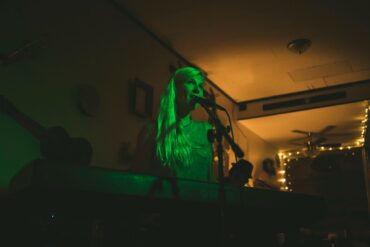
Photo by Joel Todero
Charlton: There were some other auxiliary members too at that time, and we made some music I’m very proud of. That first era of Lubec was an important time for me and Brandon and Caroline.
Jackson: I can’t speak for Eddie, but I was so stoked just to create art that I cared about and really be part of a music community.
Jay Breitling (Clicky Clicky Music Blog): Lubec even in their most nascent stages was pointed in a direction that I appreciated. And I eagerly followed along to see where it would lead.
Jackson: I had always wanted to be in a band and I was so grateful to be part of a project like this from the start. What we accomplished from there would just be icing on the cake.
Both Charlton and Jackson will claim however that Lubec didn’t really get going until they moved to Portland and hooked up with Matt Dressen (drums/vocals) and Nick Laurich (guitar during their first LP era).
Charlton: I see Lubec as having been like two or three different bands under one name. I had this thing where I was young and scared that if I changed the name the work that we had done [in Virginia] would be forgotten. I wanted a connective thread between what we had done and what we were planning to do, that was important to me.
Jackson: Eddie and I decided to move to Portland in 2011 and immediately restarted it back up here, although you could say the REAL Lubec started when Matt joined in 2013.
Charlton: I had always wanted to do the Lilys thing, but I’m not Kurt Heasley. That’s what I was after with Lubec though, especially once we moved to Portland. I was very into the idea of the journey and the environment we were in informing each chapter of the band.
Matt Dressen: Simpler times! I had just stopped playing in a band and had a lease expiring so of course I was on Craigslist and being bandless, wandered over to the musicians page and Eddie and Caroline had posted an ad looking for a drummer.
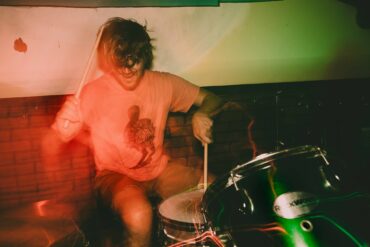
Photo by Joel Todero
Jackson: As a femme person whose primary instrument was keyboard, it seemed like everyone expected me to be a singer/songwriter type. But I was so excited to find out that I could play in rock bands, be loud, get weird, go on tour, be part of a supportive and dynamic indie music community. It was exciting.
Dressen: For Lubec, I left a pretty comfortable band situation with good friends prior to joining because ultimately it wasn’t the kind of music I wanted to be pursuing long-term.
Charlton: Once the lineup solidified around Caroline and Matt I realized that my favorite kind of music and my favorite kinds of bands were Unit Bands where every member contributes equally. The type of thing where everyone is so plugged in that music becomes about the interplay between the musicians, that’s what makes it special. I think we found that.
Dressen: I guess, out of happenstance, I found what I was looking for in Lubec pretty early on.
After some steady gigging and workshopping, Lubec mk. 2 went onto to record their first LP The Thrall. A few early songs caught the enthusiastic ear of Jordan Reidinger, then owner of the now sadly-defunct Indiana label Like Young Records, who issued the Thrall on tape.
Charlton: Once we decided on it just being the three of us we kinda got tired of the band being this sorta piecemeal thing. There was a feeling like we really had to put our noses to the grindstone.
Jordan Reidinger (Like Young Records): The way Lubec came into my life was through Brennan from another band I had worked with called Downstaaiirs.
Charlton: Those first years in Portland there was definitely a lot of growing up between the three of us, a lot of bonding. Through that experience we all realized that this was exactly the kind of band we were meant to be in.
Dressen: We pretty quickly started working on The Thrall after I joined and at the time, it was a huge dramatic endeavor that we put a lot of effort into crafting song by song.
Reidinger: I think I listened to “Local Celebrity” at least 25 times in a row. I couldn’t stop listening to it and wanted it to somehow expand in length with each listen, until it was this 5 hours sonic journey.
Charlton: To have received any recognition or label interest at all was really special for all of us, and I’m eternally grateful for all that Jordan did for this band, and for The Thrall as a record. His enthusiasm definitely gave us a confidence boost at a crucial time for us. It was thrilling to have people care.
Reidinger: I remember when we all first started contacting one another that it was something special. It felt like everyone was so excited about this record and putting it out there for the world to hear.
Dressen: At that time it felt like we and the album had the potential to be something pretty unique and special.
Reidinger: The Thrall has this power to it and this ability to hook you into the sounds happening that are unmatched by all other bands. It’s this powerful yet delicate collection of dreamy pop bliss that resonates with every feeling one could have.
Jackson: My fondest memories from that time are us just hanging out together — making dumb jokes during rehearsal or getting burritos during a recording session or sleeping in someone’s weird basement on tour.
Reidinger: Suddenly, people were just connecting with this tape on a level that was rare. I never had a tape come out where people were sending me emails about how much this record meant to them until this one.
After Laurich’s departure the trio found their way onto Dustin J.S. Watson’s radar, owner of celebrated Boston indie pop label Disposable America. DA put out their second LP Cosmic Debt and two follow up EPs on tape, cementing a fruitful partnership that operated much more like a friendship.
Dustin J.S. Watson (Disposable America): Lubec has always been a band that I felt really embodied a lot of what I was trying to do with the label at its most core level and I immediately fell in love the moment that I heard Cosmic Debt.
Jackson: Cosmic Debt means a lot to all of us, we worked super hard on it and had so much fun making it, and the final track “Ember” makes me feel both really proud and emotional.
Charlton: That record was sort of like the first time in my music career that I accomplished exactly what I had set out to do. Everything about it feels perfect to me. Up to that point, I guess I hadn’t considered what satisfaction would look or sound like. Cosmic Debt taught me to not discount my imagination in every aspect of life.
Watson: I’ve always aimed to release things through DA that first and foremost hit me on a personal level and that I am specifically proud to be attached to, then secondly hope they connect with others out there too.
Charlton: So much of my experience playing music to that point had been defined by rejection, and I had made peace with that. But, Dustin’s interest in our band was a very reassuring moment for me, it helped me know that I wasn’t crazy for believing in this thing we were building.
Jackson: Disposable America was the perfect home for Lubec, and we had an amazing experience working with Dustin for many years. I’m so grateful for the support and enthusiasm.
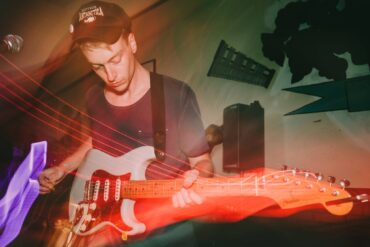
Photo by Joel Todero
Dressen: After getting to know Dustin a bit, our shared vision and all the rad stuff other bands on DA were up to, it seemed like a perfect fit.
Watson: We had built such a digital connection coast-to-coast over the years that when it came time to finally meet them on their East Coast tour, I honestly had sort of a meltdown in my apartment, like I was finally meeting my internet crushes IRL.
Jackson: What a gem of a human! I never got to know Dustin as well as the guys did, but was always extremely cognizant of his amazing support and genuinely kind nature.
Watson: The virtual to reality hurdle was huge and I built it up for absolutely no reason at all. It melted away the second I met them, the three nicest and most approachable people possible.
Charlton: Disposable America was the embodiment of everything I loved and respected about music and it was an enormous honor to be a part of it.
Jackson: Meeting Dustin in person on our east coast tour was such a treat — he was so incredibly welcoming, and made us feel like we’d known him forever.
Dressen: To have someone with amazing values and who is a gem of a human reach out from the east coast and offer so much support, I’m floored every time I think about him.
Charlton: One of the coolest things about indie rock is finding kindred spirits, I think that’s all I was ever really looking for in my pursuit of playing music. Dustin was absolutely my kind of person from the jump, and it was really gratifying to have his support behind us.
Dating back to their earliest days in Virginia, Eddie had also established an online connection with Jay Breitling of the esteemed Clicky Clicky Music Blog (full disclosure, I was also contributor to CC). With a shared love of ‘90s under-underground sounds and a mutual admiration of each other’s writerly style, Charlton began contributing to the site, creating yet another deep connection to Boston, and the east coast at large.
Breitling: I think on MySpace I must have had Lilys listed as one of my primary interests.
Charlton: Jay and Clicky Clicky in general quickly became an important part of my life. We were essentially pen pals, but it felt like we had been friends for a long time.
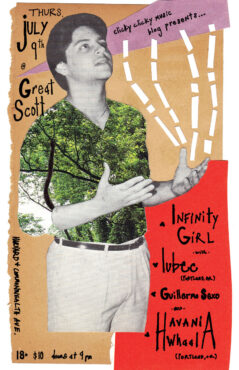
Flyer by Clicky Clicky Music Blog
Breitling: Because of my dumb blog I actually know when things happened and I can tell you that 12 years ago on or around February 16, Eddie emailed me saying he was a Lilys fan, which even now when you say that to someone it’s like knowing the secret handshake or the address for the illegal rave in the disused railway barn.
Charlton: Basically all I had wanted for Lubec more than anything was to receive affirmation from people that I respected. When Jay and I first connected about the band it became immediately obvious that I also wanted to take part in what he was building with Clicky Clicky.
Breitling: Lubec was in its earliest iteration when Eddie emailed me, and were still operating from within the hallowed halls of a fine undergraduate institution in the great Commonwealth of Virginia.
Charlton: That Jay was willing to both say nice things about the band and also periodically check in on us as someone who had been through the scene as it were, that was huge for us.
Breitling: I think I asked if I could share the song [“Gang Knife Battles”] on the blog, and if the band was willing to answer questions for a feature I did about band practice spaces.
Breitling: Meeting Eddie and Caroline and Matt from Lubec was super fun and exceeded expectations. Not because I thought they were going to be jerks IRL, but because they were even nicer in person than in electronic correspondence, we had tons of things in common –these were my people.
Charlton: It’s funny now to think about how we got so much love and support from Boston, a city that prior to touring I had spnet a grand total of like three days in.
Dressen: While I wasn’t as close to him as Eddie was, I always appreciated Jay’s enthusiasm both for our band and music in general. I also really enjoyed doing the [Lilys covers] Clicky Clicky comp and can say now that we shared an album with Speedy Ortiz. Thanks, Jay!
With support from DA and Clicky Clicky along with a small network of friends and contacts, Lubec plotted a tour down the east coast in 2015, making IRL friends out of some long time pen pals. Doing so again in 2017 as well.
Jackson: That tour that we did together with Havania Whaal was particularly rad, the five of us (including Paul and Noelle from HW) had a blast.
Dressen: I just love traveling and am from Kansas, so anytime we could head out anywhere, I relished the chance!
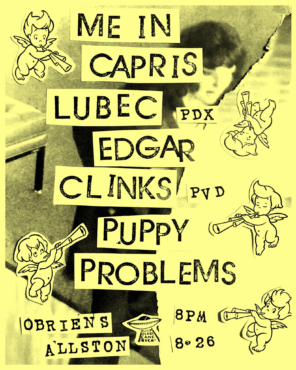
Flyer by Disposable America
Jackson: Touring there in general was a trip for me because I grew up in the suburbs of Maryland and had no idea all this DIY & indie music was happening all around me — I just didn’t know about it, and my parents were really strict.
Watson: Finding bands to match Lubec sonically is hard enough, but finding those bands and then also trying to book them to play together is near impossible.
Dressen: I’ve always been super grateful for his support, because honestly, there wasn’t a ton of it from other labels/elsewhere so to have his genuine backing meant a lot, especially knowing how much he sacrifices for the bands on DA.
Breitling: For me, booking Lubec [in Boston] was a no-brainer, a foregone conclusion. It was something Eddie and I had talked about for a long time should Lubec ever get an east coast run of dates together.
Jackson: Our first night in Boston was kind of funny because we heard there was a big show going on at another venue right down the street so ours was a small crowd, but we loved the other bands we got to play with and had a great time hanging with Jay and exploring the city.
Breitling: The bill was a no-brainer because I was enamored with Infinity Girl from the jump, just blown away by their first full length and that the band at least from my vantage point burst onto the scene fully formed like Athena from Zeus’ head. Guillermo Sexo was a band I had admired for a long time, too. But that’s not why you called.
Dressen: I met Jay at Great Scott when we were on tour back in 2015. Another amazing person who just offers a ton of support for bands that he genuinely loves.
Breitling: I was an older guy vaguely participating in a scene that is basically perpetually 25, so most of my interaction with people was already electronic in the first place. Which made sitting on the [Great Scott] patio drinking beers with them an exceptionally fond memory: it was real. The beers were delicious.
Watson: I spent hours pacing Harvard Ave. building it up to be this big professional meeting that was about to happen and not what it really was, a coming together of some friends.
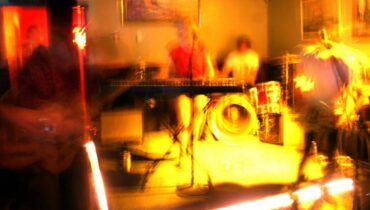
Photo courtesy of Lubec
Charlton: Getting to meet Jay and then Dustin as well after years of online correspondence was among the greatest moments in my life, no doubt.
Watson: Me in Capris, Puppy Problems, Edgar Clinks, and Lubec is most definitely a legendarily wildcard line up and artifact of the time.
Dressen: I loved our trips to Boston, Brooklyn, Montreal and Philly not just for the poutine and pizza but for the bonding and for all the amazing folks and family we met or reconnected with out there.
Jackson: It was a blast just to explore these cities together and share our music with new audiences. Eddie and I also got to meet up with many friends from the East Coast who we hadn’t seen in years which was special.
Dressen: I think we always got a pretty solid reception out there {on the east coast] plus, all of these support networks between DA and Clicky Clicky were amazing and led to some really fun opportunities and us meeting heaps of rad bands.
By 2016, Lubec had ingratiated themselves heavily into the Portland DIY by running a house show venue called The Boathouse. It’s there that they forged connections with some younger bands and writers still holding the torch for sounds outside the trendy and fleeting indiesphere.
Jackson: I get credit for finding that house! We were all planning to move in together in 2014 and our only criteria was affordable plus basement plus not a total shithole, and we super lucked out.
Dressen: The Boathouse was a house that we all lived in for a time (Eddie and I for like seven years) and practiced out of.
Charlton: The Boathouse thing just happened organically, I had been helping organize shows here and there, and it was clear that there was a real need for all ages shows and more DIY activity in general.
Delaney Motter (founder of the music publication Phluff): I met Eddie first at a house show in early 2016. We found out we had the same birthday (though quite a few years apart) and that same night we committed to having a joint birthday party.
Charlton: There was this amazing crop of younger bands on our side of the country that felt kinda underserved in terms of space to play, and platforms for them to get their music heard, and we were honored to be a part of that.
Motter: Eddie, Caroline, and Matt are all such warm, kind individuals and they always offered their unwavering support to me and all of my endeavors. Lubec hyped Phluff from day zero. They also helped usher me into a community that I now feel a huge part of.
Dressen: We had always benefited from a few of our friends throwing house shows, so at a certain point we decided to test the waters.
Charlton: That period of time was definitely the most fun I had ever had in music. The people we were playing with, the people we were hanging out with, the shows we were organizing at the house, it all felt very consequential.
Dressen: Some of those shows were pure magic, though. Blue Smiley and Young Jesus were particularly impactful experiences down there and I think we all feel pretty honored to have provided the space for those moments.
Those within the Lubec orbit will look back on this band as a shining example of how to be a band’s band. Beyond the innovative records and superb live shows, Lubec leaves behind a legacy of shared compassion for each other, the music they made, and the community they helped foster (or at the very least positively influenced).
Dressen: I think we were a mainstay from a particular time that people may have appreciated to various degrees and hopefully we’re remembered favorably for our contribution to Portland DIY.
Jackson: One thing I always appreciated about the Portland scene in general is it has always felt less siloed to me than some other cities’ scenes. We could just be ourselves and, for the most part, feel welcome.
Charlton: I almost feel indulgent talking about the band and what we accomplished and how we saw ourselves within the scene or whatever, but it’s also very therapeutic. Things could have gone a little better in terms of recognition or whatever, but I’m immensely proud of the music we made together.
Breitling: When people think about the music of Lubec I hope they think of magic and awe and revelation and drama and romance. Of mapmakers and Magellan, Victorian paratextuality and Reepicheep the talking mouse.
Watson: Beyond any sense of large scale marketability or whatever things I’m supposed to keep in mind, they just purely felt like a band built for me.
Breitling: An ending is always inevitable. But it is an acute thrill to be able to support your favorite acts for however long knowing that it can’t last forever.
Reidinger: They continuously got better and better and to have the connection with such an incredible band as Lubec as I do, it makes me feel truly honored and humbled in every way imaginable.
Breitling: I hope when people look back on Lubec they marvel at how the nicest kids in the scene were able to make such fascinating music from within the gravitational pull of such profound niceness. I hope they think of talent and dedication to the craft too.
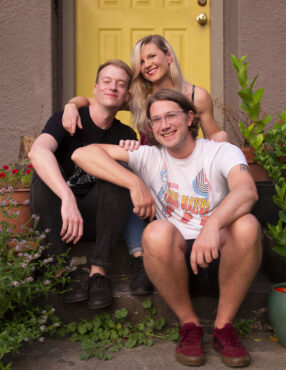
Photo by Sam Reynolds
Motter: I’ll miss Lubec so much that it hurts to think about. They were a formative component to who I have become in the music community, and I’m incredibly thankful to have crossed paths with and befriended such wonderful people.
Reidinger: I am convinced that these three humans are truly the most talented beings this earth will ever know and I love them so much and miss them so much.
Jackson: Matt and Eddie will always always be lifelong ride-or-die homies. We’ve lived together, we’ve experienced loss and joy together, we’ve impacted each other’s ongoing careers.
Charlton: What I learned from being in Lubec absolutely transfers over to the work I do now in organizing. I try every day to apply the principals I gained from our time in DIY as a means of reaching people who may not have any idea what unions do and why they’re important. Those lessons are universal.
Dressen: Being in Lubec exposed me to broader musical channels, experiences and friendships that I would have never had otherwise.
Jackson: It always meant so much when people at shows or music writers or other bands connected to our music, but the real goal was just to make stuff we were proud of and that reflected who we were as musicians.
Motter: They are just outright amazing human beings with an immense amount of talent that oozes from their craft, whatever it is they’re doing.
Breitling: The promise of Lubec, the potential that Lubec’s existence signaled and stood for, that is a true loss. I’ll feel that for a long time.
Reidinger: Thank you Caroline, Matt and Eddie for everything you have given me. I will always be the most thankful.
Dressen: I have no regrets and we ended up forming way more valuable friendships along the way and that is worth more than any artificial success we could have had.
Jackson: It may sound super cheesy, but their friendship and support is the greatest influence in my life to this day.
Charlton: I don’t know, being in a band it sometimes feels like things are bigger to you than they are to people outside of it. I do know that I can’t imagine having done it with anyone other than Caroline and Matt. I hope that makes sense.
As its members say goodbye to the Lubec era we are pleased to report that Matt and Caroline are continuing to make music in a variety of configurations while Eddie is committed to fighting the good fight in labor organizing. All three stress how their time in the band positively effects every element of their lives: how they operate at their jobs, navigate other creative endeavors, even how they take up space as citizens of the world.
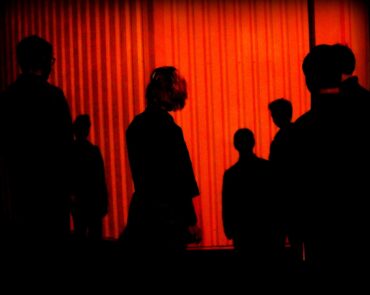
Photo by Matt Dressen
Like any band worth honoring upon its completion, Lubec was first and foremost an intense friendship. They were something like a syndicate, carrying a shared philosophy about music that informed their shared philosophies about life. That’s not something you ever truly walk away from unscathed, it’s the type of thing you build a life around. When you immerse yourself so fully in below-the-radar art like the beautifully composed chaos Lubec and their compatriots kicked up, a different–possibly better, but certainly less boring–world opens up to you in ways most people will never know.
Eddie, Caroline, and Matt will be the first to tell you how experiences collected inside the sweaty basements and tiny rock halls that dot our sphere are significant, life changing. The band saw themselves as part of a greater tradition, paying tribute to their heroes by making art for themselves that reflected who they were as people, without concern for fame or any other trappings. Loving independent music at that level isn’t a pose, it’s an alternate way of being. Which is to say, accolades and huge sales were never as important to the band as the real connections they made with the humble group of people lucky enough to call themselves Lubec fans. Now that’s an admirable feat.
You can find Lubec tapes and digital goods at Disposable America.
